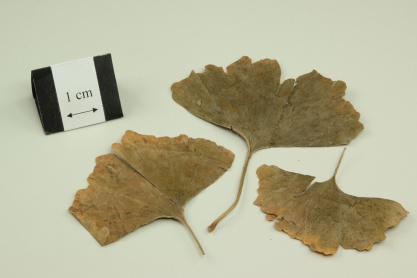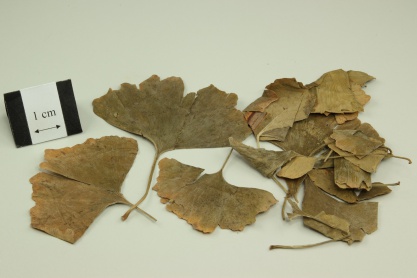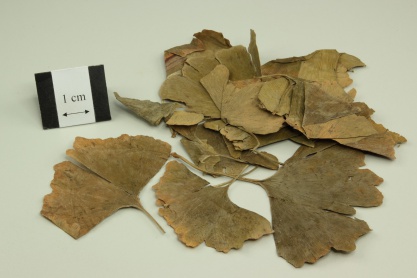銀杏葉
- ENG
- Ginkgo Leaf
- LATIN
- Ginkgo Folium
| Medicinal Group | Cough-suppressing and panting-calming medicinal |
|---|---|
| Source | Dried leaf of Ginkgo biloba L. (Fam. Ginkgoaceae) |
| Nature and Flavors | sweet, bitter, astringent; neutral |
| Meridian Affinity | Heart, Lung |
| Actions | To astringe the lung-qi and relieve dyspnea, to activate blood circulation and eliminate the blood stasis, and to relieve pain |
Family
Ginkgoaceae
Part used
Leaf
Indications
Deficiency of lung marked by cough; coronary heart disease, angina pectoris, and hyperlipemia
Research Findings
- Ginkgo biloba leaf tablet showed good efficacy in promoting episodic memory function in mild cognitive impairment patients.[1]
- The leaf extract of Ginkgo biloba L. has been used for years to treat age-related memory-deficit problems, including Alzheimer's and dementia. Experimental and clinical studies have revealed its beneficial effects on a wide range of pathological conditions including hepatoprotective, photoprotective effects, DNA repair mechanism, antioxidant and anti-inflammatory activities. Recent studies have also suggested that leaf extract of G. biloba L. may exert beneficial effects on cancer.[2]
- The extract from Ginkgo biloba leaf can lower blood lipid levels and urinic protein in children with nephritic syndrome and improve their clinical syptoms and the renal function. [3]
- The Ginkgo leaf extract has been reported to have neuroprotective, anticancer, cardioprotective, stress alleviating, and memory enhancing effects and possible effects on tinnitus, geriatric complaints, and psychiatric disorders.[4]
- Antioxidant Ginkgo biloba leaf extract exhibited a mild effect on psychological state and a trend of improving glycemic control in patients with type 2 diabetes mellitus.[5]
- Ginkgo biloba leave extract has been prescribed to treat CNS disorders such as Alzheimer's disease and cognitive deficits.[6]
- Numerous preclinical studies have shown the neuroprotective effects of standardized extract from the leaves of the Ginkgo biloba tree and support the notion that it may be effective in the treatment and prevention of neurodegenerative disorders such as Alzheimer's disease. [7]
- The potential use of Ginkgo biloba extract 761 has been proposed for the treatment of psychiatric disorders such as anxiety and depression. [9]
- Ginkgo biloba leaf extract (Ginaton) could improve cerebral oxygen supply, promote superoxide dismutase activity to inhibit production of free radicals in patients undergoing cardiopulmonary bypass. [10]
- Ginkgo biloba L. can reduce the severity of premenstrual symptoms.[11]
- Extract from Ginkgo biloba leaves has been reported to have antioxidatant properties, to modify vasomotor function, to reduce adhesion of blood cells to endothelium, to inhibit activation of platelets and smooth muscle cells, to affect ion channels, and to alter signal transduction.[12]
- In clinical trials of different working-groups, effects of Ginkgo biloba on the cognitive performance, global function, and activities of the daily living have been found.[13]
- The combined therapy with hypha cordyceps and ginkgo leaf tablet could effectively improve micro-inflammation reaction exists popularly in patients undergoing maintenance hemodialysis. [14]
- Ginkgo biloba appears as a useful and sensible supplementary medication to treat Alzheimer's disease. [15]
- Ginkgo leaf extract could decrease the plasma level of vascular endothelial function, raise the plasma nitric oxide level and improve the endothelium dependent vascular dilating function in diabetic nephropathy patients.[16]
- Clinical studies have shown that ginkgo extracts exhibit therapeutic activity in a variety of disorders including Alzheimer's disease, failing memory, age-related dementias, poor cerebral and ocular blood flow, congestive symptoms of premenstrual syndrome, and the prevention of altitude sickness.[17]
- Favorable results have been obtained in double-blind, placebo-controlled, comparative trials of patients with memory disorders, obstructive arteriosclerosis, and dementia.[18]
- Ginkgo Leaf Tablet can decrease serum normal T cell expressed and secreted level in patients with diabetes mellitus type 2. [19]
- Holistic fresh leaf extract of Ginkgo biloba is a safe, effective, and, at least, adjuvant treatment option for patients with mild cognitive impairments.[20]
- Folium Ginkgo extract displays the effects of nerve tissue protection and hypoxia-ischemic brain injury alleviation.[21]
Cautions
Contraindicated in patients with exterior pathogenic factors
Report on adverse effect
Ginkgo should be used with caution during pregnancy, particularly around labour where its anti-platelet properties could prolong bleeding time.[8]
Headaches, gastrointestinal disturbances, and allergic skin reactions are possible adverse effects [22]
Reference
Reference
- Zhao MX, Dong ZH, Yu ZH, Xiao SY, Li YM. (2012). Effects of Ginkgo biloba extract in improving episodic memory of patients with mild cognitive impairment: a randomized controlled trial. Zhong Xi Yi Jie He Xue Bao. , 10(6):628-34.
- Mohanta TK, Tamboli Y, Zubaidha PK. (2014). Phytochemical and medicinal importance of Ginkgo biloba L. Nat Prod Res. . , 28(10):746-52. doi: 10.1080/14786419.2013.879303. Epub 2014 Feb 5.
- Zhong ZM, Yu L, Weng ZY, Hao ZH, Zhang L, Zhang YX, Dong WQ. (2007). Therapeutic effect of Ginkgo biloba leaf extract on hypercholestrolemia in children with nephrotic syndrome. Nan Fang Yi Ke Da Xue Xue Bao. , 27(5):682-4.
- Mahadevan S, Park Y. (2008). Multifaceted therapeutic benefits of Ginkgo biloba L.: chemistry, efficacy, safety, and uses. J Food Sci. , 73(1):R14-9. doi: 10.1111/j.1750-3841.2007.00597.x.
- Lasaite L, Spadiene A, Savickiene N, Skesters A, Silova A. (2014). The effect of Ginkgo biloba and Camellia sinensis extracts on psychological state and glycemic control in patients with type 2 diabetes mellitus. Nat Prod Commun. , 9(9):1345-50.
- Chan PC, Xia Q, Fu PP. ( 2007). Ginkgo biloba leave extract: biological, medicinal, and toxicological effects. J Environ Sci Health C Environ Carcinog Ecotoxicol Rev. , 25(3):211-44.
- Shi C, Liu J, Wu F, Yew DT. (2010). Ginkgo biloba extract in Alzheimer's disease: from action mechanisms to medical practice. Int J Mol Sci. , 11(1):107-23. doi: 10.3390/ijms11010107.
- Dugoua JJ, Mills E, Perri D, Koren G. ( 2006). Safety and efficacy of ginkgo (Ginkgo biloba) during pregnancy and lactation. Can J Clin Pharmacol. , 13(3):e277-84. Epub 2006 Nov 3.
- Montes P, Ruiz-Sanchez E, Rojas C, Rojas P. (2015). Ginkgo biloba Extract 761: A Review of Basic Studies and Potential Clinical Use in Psychiatric Disorders. CNS Neurol Disord Drug Targets. , 14(1):132-49.
- Deng YK, Wei F, Zhang DG. (2006). Brain protective effects of ginkgo biloba leaf extract (ginaton) in patients undergoing hypothermic cardiopulmonary bypass. Zhongguo Zhong Xi Yi Jie He Za Zhi. , 26(9):795-8.
- Ozgoli G, Selselei EA, Mojab F, Majd HA. (2009). A randomized, placebo-controlled trial of Ginkgo biloba L. in treatment of premenstrual syndrome. J Altern Complement Med. , 15(8):845-51. doi: 10.1089/acm.2008.0493.
- Zhou W, Chai H, Lin PH, Lumsden AB, Yao Q, Chen C. (2004). Clinical use and molecular mechanisms of action of extract of Ginkgo biloba leaves in cardiovascular diseases. Cardiovasc Drug Rev. , 22(4):309-19.
- Loew D. (2002). Value of Ginkgo biloba in treatment of Alzheimer dementia. Wien Med Wochenschr. , 152(15-16):418-22.
- Huang JC, Li JH, Liu TX. (2008). Effect of combined therapy with hypha Cordyceps and ginkgo leaf tablet on micro-inflammation in patients undergoing maintenance hemodialysis. Zhongguo Zhong Xi Yi Jie He Za Zhi. , 28(6):502-4.
- Zimmermann M, Colciaghi F, Cattabeni F, Di Luca M. (2002). Ginkgo biloba extract: from molecular mechanisms to the treatment of Alzhelmer's disease. Cell Mol Biol (Noisy-le-grand). , 48(6):613-23.
- Li XS, Zheng WY, Lou SX, Lu XW, Ye SH. (2009). Effect of Ginkgo leaf extract on vascular endothelial function in patients with early stage diabetic nephropathy. Chin J Integr Med. , 15(1):26-9. doi: 10.1007/s11655-009-0026-8. Epub 2009 Mar 7.
- McKenna DJ, Jones K, Hughes K. (2001). Efficacy, safety, and use of ginkgo biloba in clinical and preclinical applications. Altern Ther Health Med. , 7(5):70-86, 88-90.
- Yoshikawa T, Naito Y, Kondo M. ( 1999). Ginkgo biloba leaf extract: review of biological actions and clinical applications. Antioxid Redox Signal. , 1(4):469-80.
- Wang XX, Sun ZL, Yu JY. (2007). Effect of Liuwei Dihuang soft capsule and Ginkgo leaf tablet on serum regulated upon activation, normal T cell expressed and secreted in patients with diabetes mellitus type 2. Zhongguo Zhong Xi Yi Jie He Za Zhi. , 27(4):315-7.
- Bäurle P, Suter A, Wormstall H. (2009). Safety and effectiveness of a traditional ginkgo fresh plant extract - results from a clinical trial. Forsch Komplementmed. , 16(3):156-61. doi: 10.1159/000213167. Epub 2009 May 14.
- Wang L, Wu XY. (2002). Effect of folium ginkgo extract on the erythrocyte immunity function and serum lipid peroxide in asphyxia neonate. Zhongguo Zhong Xi Yi Jie He Za Zhi. , 22(4):267-9.
- German Commission E monograph, Trockenextrakt (35–67: 1) aus Ginkgo-biloba-Blättern Extrakt mit Aceton-Wasser. Bundesanzeiger, 1994, 46:7361–7362.












